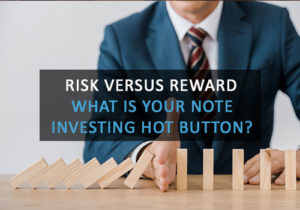By now you have read an article or two (or ten) about the benefits of purchasing or brokering private notes.
There is no debate that owning a cash flow can mean fewer headaches than actual real estate. But the advantages of becoming proficient in the note industry go well beyond just purchasing a note and getting a solid return.
Here is just one of the really great features you won’t find at your local bank savings account…
YOU Dictate The Terms Of The Note Investment.
 When you purchase a note, you get to decide what yield you want and what level of risk you want to take.
When you purchase a note, you get to decide what yield you want and what level of risk you want to take.
For example, maybe your note investing ‘hot button’ is the risk. You want as little risk as possible.
You can look for notes with really good LTVs (Loan To Value). Meaning the payor on the note owes a much lower amount compared to the value of the property.
For example…
Sale Price: $125,000
Down Payment: $75,000
Current Balance: $50,000
On this deal, the LTV is only 40%.
You would purchase the 1st position note of $50,000 for something less than $50K (we tend to buy notes at some sort of discount).
Why Is Low LTV On A Note So Good?
What is the likelihood, if the payor stops paying, you are going to get your money back out of the deal?
Very good.
Very very good.
Matter of fact, even if you don’t want to mess with taking back the house, cleaning it, and flipping it, you could probably sell the now non-performing note to another investor for at least what you have in it.
This kind of great security comes with an offset.
You are most likely not going to get double-digit returns on this deal. But, in this case, the risk was our concern.
We are willing to make less yield/return in exchange for less risk. Maybe we earn 7% on our money… that’s still better than parking it in a bank!
Conversely, you can take more risk in exchange for higher returns.
For example…
Sale Price: $125,000
Down Payment: $10,000
Current Balance: $115,000
On this deal, the LTV is only 92%.
Yikes, not much equity in that deal!
At least not enough to stop a seller from walking away if they start to have trouble making payments.
Here Is Where The Flexibility Of Note Investing Comes In.
- You are going to be able to purchase this type of deal at a much higher discount. Hence a much bigger return – IF they pay.
- You can also purchase ‘part’ of the note. Maybe you just buy the next 5 years of payments. This helps lower your exposure (or Investment To Value) in the deal while staying in a strong position AND getting a good return.
What kind of note investor are you? Are you willing to take some risk to push your investment returns or are you wanting to back off the returns in exchange for lower risk notes?
The choice is yours!


I had a “formula” that let me make an offer based on what return I required, but it is lost somewhere in my excessive pile of paperwork or maybe, just possibly, it slipped off the desk into the round file never to be seen again.
Do you have such an animal, and if you do, may I have a copy?
Hello Geo,
It sounds like you are talking about the IRR calculation using the time value of money. We share some of the standard calculation steps here: https://noteinvestor.com/notes-101/buying-mortgage-notes-7-calculator-tips/
Tracy
Location and borrowers profile.
You wouldn’t want to own a New Jersey note or if you do, you’d want a bigger discount to “hopefully” get a higher yield, why? Foreclosure timeline. According to ATTOM Data Solutions, the average timeline for completed foreclosures in the second quarter of 2018 in NJ was 1161 days! Imagine having no cash flow for more than 3 years. Yikes. In Hawaii it’s 1153 days!
This is one of the reason why i deal primarily with Texas notes.